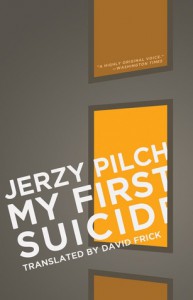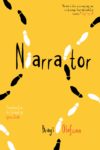Tr. from Polish by David Frick
“I am composing short stories now. A collection of short stories of a different sort,” says the narrator of Polish writer Jerzy Pilch’s recently translated My First Suicide, his third book to be published in English by Open Letter Books. The beautiful woman to whom he is speaking taunts him with the following question: “A novel is less than a novel, but a volume of short stories is more than a volume of short stories?”
Like The Streets of Crocodiles by Pilch’s countryman Bruno Schulz, My First Suicide is not quite a novel proper, nor is it merely a collection of stories. It is a novel that is more than a novel, and a volume of short stories that is more than a volume of short stories. Pilch utilizes the strengths of each medium in the same way Sherwood Anderson did with Winesburg, Ohio or William Faulkner did with Go Down, Moses. He creates a reading experience that might never become as iconic as the ones Schulz and Anderson and Faulkner provide in their respective collections, but it is one that is as enthralling as any of those, and undoubtedly more humorous. It is unlikely that a reader will be able to get through any of these ten stories without, at the very least, cracking a smile.
The first story in the collection, “The Most Beautiful Woman in the World,” announces its subject up front, even though the narrator quickly admits that “if she wasn’t The Most Beautiful Woman in the World in the strict sense, she was in the top ten, and if it wasn’t the top ten, then the top one hundred — the details are unimportant.” And yet those final words, “the details are unimportant,” ironically highlight exactly how the details are important, for it is in these details and digressions that his prose takes on both a wry humor and a poetic elegance.
In “The Double of Tolstoy’s Son-in-Law,” the full extent of Pilch’s humor and poesy is on pyrotechnic display, emerging from the narrator’s obsession with details even while he amusingly denies this obsession. The story begins with a photograph of Tolstoy playing chess with his son-in-law. This jumping off point allows the narrator to embark on a series of fascinating asides sparked by the coincidence of Tolstoy’s son-in-law looking like someone from the narrator’s past.
But the fact that he reminds me of someone seems unimportant: it is too ostentatious, it is too much on the surface, and it also looks like a mysterious, although trite, addendum.
The mystery of the double takes a backseat to the excursuses this coincidence engenders. Pilch ties a textual Gordian knot, one piece of the story tangled into another. It is in these literary contortions, prevalent in nearly every story, that Pilch begins to resemble another Polish writer, Witold Gombrowicz, with whom he is frequently compared. I was wary of these comparisons before reading Pilch — after all, what contemporary writer warrants comparison with a master of that caliber? — but after having read Pilch’s work I admit that the comparison is apt, and isn’t just a lazy linking of Polish author with Polish author. He honestly does seem the product of Gombrowicz and Schulz, the perfect Polish literature lovechild.
Pilch’s narrator is a Gombrowiczian character with a surreal Schulz-like view of Polish family life, transposed into an era of HBO and SMSes. At times he seems peculiar, unique, unreal. Yet the more you read of him the more you feel an affinity for him and a kinship with him; there’s a profound humanness in his peculiarities. He’s prone to digressions, plagued with obsessions, preoccupied with sex, and overcome with regrets:
To the end of your life you will regret that you didn’t touch the woman created by Saul Bellow who was named Renata; that the mistress of the Frenchman was not your mistress; that you didn’t take Kitty away from Levin; that you didn’t undress Singer’s sensuous Jewesses; Kundera’s eccentric Czech women; Solzhenitsyn’s labor camp prisoners, gaunt like models; Márquez’s golden-skinned mulattoes; Bunin’s impoverished gentrywomen; Kafka’s pencil-pushers dressed in white blouses. Personally — I must confess — I even feel affection for the most frequently used of all literary asses: Anna Karenina, Madame Bovary, and Clavdia Chauchat. I regret that I didn’t unbutton the first one’s corset; that I didn’t treat the second with all the brutality she deserves; that the third didn’t come to my room on New Year’s Eve.
Notice the switch here between the “you” and the “I.” Even amidst all the specificity of character and all the intimate details of his life, it’s hard not to mirror this pronoun confusion, to feel drawn into a unity with Pilch’s protagonist, even if you’ve never felt compelled to imagine unbuttoning Anna Karenina’s corset. But whether or not you can feel a kinship with the odd little narrator of these tales, it would be hard not to appreciate Jerzy Pilch’s ability to weave a tapestry out of language. His prose, like The Most Beautiful Woman in the World from the collection’s first story, is “dazzling in a planetary sense.”
This post may contain affiliate links.








